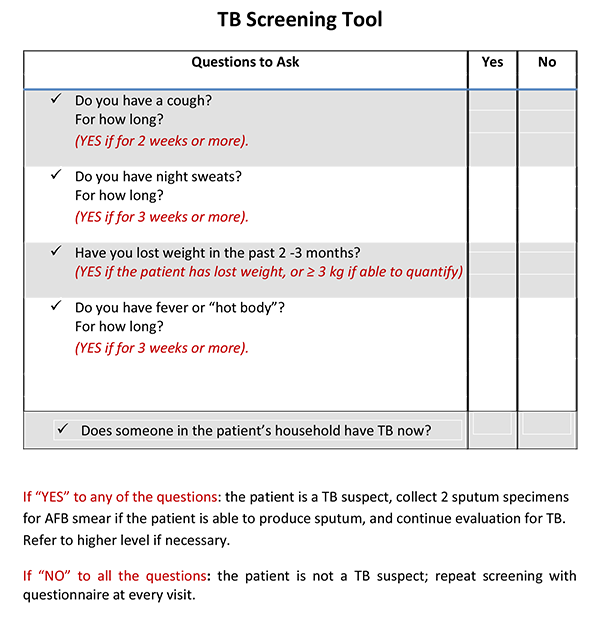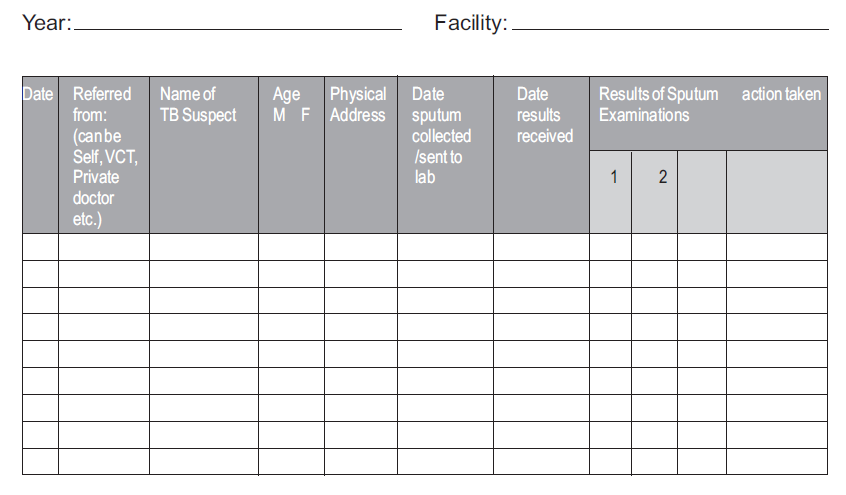-
Role Play: TB Screening Tool
Role Play
Show the mentee the TB screening tool. Try to have a printed copy to give to him or her. Alternatively, show the tool on the tablet or ask him or her to write it down on paper that he or she can keep. Explain to the mentee that you are going to engage in a role play to help him or her learn how to use the TB screening tool. He or she will play the role of health care provider, and you will be the patient.
Show the mentee the instructions below for the health worker. Then, tap on the box for the patient instructions. Do not show this to the mentee.
This person came to the health facility because he or she has a stomach ache and cough. Determine whether you consider the patient a presumptive TB case by using the TB screening tool. Ask why the patient has come to the health service and identify any signs and symptoms of TB.-
Patient instructions (mentor). Do not show this to the mentee.
Your task is to act the role of a typical presumptive TB case. You have stomach ache plus cough for longer than a three weeks and feel unwell. Today, you have come to the health facility because you want some medicine to make you feel better.
You do not know much about TB.
Your job is to listen carefully during the role play so that you can comment on what was done well and what could be improved.
Check the boxes below to indicate whether the mentee asked the appropriate questions. At the end of the role play, review any problem areas with the mentee.
Note:Remind mentee that HIV infected persons may not present with cough because their immune systems are compromised. Consequently, it is important to suspect TB in any patient who has any signs or symptoms suggestive of TB, even without cough.Ask follow up questions- “Who should be screened using the TB tool?”
- “Who should use the screening tool?”
-
-
Case Study: TB Screening Tool
Case Study
Tell your mentee that you will review a case study and ask some questions to help him/her improve skills in using the TB screening tool.
A newly diagnosed HIV patient complains of a cough of 4 weeks duration. He has no fever, but reports a lack of appetite. He lost some weight after having diarrhoea that resolved after 2 weeks.
Ask the mentee:
- What are the important symptoms to note?
- What do the symptoms tell you?
- What is the potential diagnosis?
- How will you follow up with the patient?
-
Discussion: TB Screening Tool
Discussion
Ask your mentee to reflect on using the TB screening tool.
Discussion Questions:
- What are the benefits to using the TB screening tool?
- What are questions you still have about using the TB screening tool?
- What some barriers are to correctly screening patients for TB?
- How can you overcome these barriers?
- How can I support you in properly screening patients for TB?
-
Discussion: Presumptive TB Case Register
Discussion
Review the sections of the resumptive TB case Register together and discuss questions. Tap to reveal feedback for some questions.
Discussion Questions:
-
What is this register used for?
It is a record of all patients identified as presumptive TB cases at the health facility as well as a record of all sputum samples sent to the laboratory.
-
Where is the TB Register kept?
The tuberculosis suspect register should be kept at the health facility entry point such as: Out Patient Department.
-
When is this form filled out?
Whenever you identify a presumptive TB case, you should list the presumptive TB case in the register.
-
Why is it so important to fill in the name and address of the presumptive TB case?
In order to locate the person if the result is positive and the presumptive TB case does not return to the health service. And, so that treatment can start as early as possible, thereby reducing the risk of transmitting TB to household contacts and community members.
-
Who is responsible for filling out this register in this facility?
The sister in charge of Out Patient Department should maintain the suspect tuberculosis register.
- Are there any issues or barriers to using this register?
-
What is this register used for?
TB/HIV Co-Infection: Screening
Learning Objective:
- Identify presumptive TB cases using the TB screening tool
-
Assessment
Quiz
Tell your mentee you would like to assess their knowledge related to TB screening with a short scenario. Ask your mentee the following questions. In the answer section, the text in italics are notes for the mentor.
-
Question 1
A 29 year old male presents to the ART/OI unit. He reports that he has been losing weight and has an irritating productive cough. What tool, if any would you use to guide your discussion with this patient?
Mentee should mention the TB screening tool.This patient should be screened with the TB screening tool upon arrival at health facility.
-
Question 2
What questions would you ask this patient about their symptoms?
Mentee should mention the TB screening tool questions or ask questions related to criteria and symptoms noted on the screening tool. If they do not mention all five, explain which one they missed.- How long have you had the cough?
- How much weight have you lost and over what period of time?
Also consider very low weight (wt for age <-3 z-score or underweight (wt for age <-2 z-score) or weight loss of>5% since last visit or flattening growth curve in children more than 12 months old as part of TB screening.
- Do you have night sweats and for how long?
- Do you have a fever or ‘hot body’ and for how long?
- Do you live with anyone who has TB?
-
Question 3
Ask your mentee how long the patient must have each symptom to be considered a "presumptive TB case":
- Cough
- Night sweats
- Weight loss
- Fever
- Cough: 2 weeks or more.
- Night sweats: 3 weeks or more.
- Weight lost in what period of time: 3 or more kg in the past 2–3 months.
- Fever or ‘hot body’: 3 weeks or more.
-
Question 4
You discover that this patient is a presumptive TB case. What do you do next?
“Fast track” presumptive TB cases for rapid diagnosis and care services.
-
Question 5
Who should be screened for TB in your health facility?
All adults entering the health facility. Some people who have infectious pulmonary TB do not feel sick or do not mention their cough when they come in for another reason. Some sick patients do not cough but may have other signs and symptoms suggestive of TB and should be examined.
The most effective way to reduce TB transmission in the community is to detect and treat infectious cases at an early stage…even before the symptoms cause the person to seek care!
-
-
Activities
-
Mentor Resources

